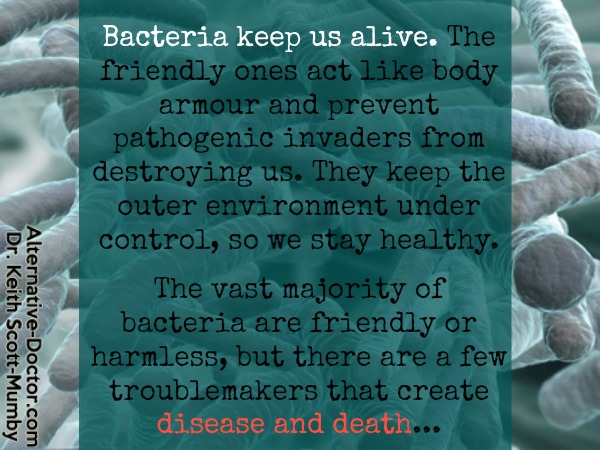Bacteria are single-celled organisms. They come in a variety of shapes: round spheres (called a coccus, plural cocci), rod-shaped (called a bacillus, plural bacilli), spiral- shaped (called a spirochete, plural spirochetes) and a few odd-balls (no plural!)Bacteria are the oldest living organisms on planet Earth. Since they don’t produce “babies” (offspring), but reproduce by just splitting in two, you could say that bacteria represent an original founding organism which is now billions of years old!
Respect! Yes.
Estimates of how many cells make up a human being vary—between 1 trillion and 100 trillion. I’ve seen both.But what is clear is that there are 10 TIMES more bacteria in you and on you than the actual number of cells that go to make up YOU!
Respect? Yes.
Bacteria have only one single strand of DNA that encodes their nature. We humans have about 25,000- 30,000 genes that make up our humanness.
But there are over 100 more bacterial genes, on you and in you, which all matter. That’s 3 million genes, set against your measly 1%. What happens to your bacteria, happens to you. Trust me.
We need lots of respect for those single-cell organisms that are all-but part of us.
In fact bacteria keep us alive. The friendly ones act like body armour and prevent pathogenic invaders from destroying us. They keep the outer environment under control, so we stay healthy. They digest our food. They make certain vitamins for us.
Remember, the vast majority of bacteria are friendly or at least harmless. There are just a few troublemakers that create disease and death.
However, there is a real mystery. How do they do anything at all? I mean, there is no brain or nervous system. They don’t have any obvious means of communicating or interacting. How do bacteria get organized to make somebody sick or healthy? They are so tiny and inconsequential, it seems unreasonable they could affect us at all, while acting individually.
It’s a paradox. Or was!
According to Professor Bonnie Bassler at Princeton there has been a breakthrough discovery. Bacteria, it seems, have a secret chemical conversation system. It’s called “quorum sensing.” As it turns out, every type of bacteria makes and secretes small molecules (a bit like hormones). When a bacterium is alone, these molecules have no effect (no receptors).
But when there’s a large enough group of bacteria, these secreted molecules reach a critical level and suddenly all the bacteria begin to act as a synchronized group, based on the characteristic behavior programmed into the genes.
This was first discovered by Bassler, observing a marine bacterium called Vibrio fischeri. This little organism emits light. But when a suspension of bacteria is so dilute they are, in effect, isolated, nothing happens. Only when the bacterial concentration—and hence the level of quorum sensing signals—reaches a certain level, then all the bacteria “switch on” at once and begin to glow in the dark.
It seems remarkable that tiny organelles, without any apparent sense organs, can suddenly tell who is in the neighborhood and how many neighbors there are!
Incidentally, they can talk inter-species too. A second quorum sensing mechanism, possessed of all bacteria and working interspecies, is what Bassler calls a “bacterial Esperanto”.
Neat huh? But not good if you are the victim.
However this remarkable discovery by Bassler has two important consequences, both with enormous medical implications.
- A whole new type of antibiotics can be looked for, which will effectively block the quorum sensing molecules (like jamming the enemy radar)
- Health can be built, helping to block out bad bacteria, by supporting and provoking the chemical sensing of the good, friendly bacteria that support us!
Watch out, this is the way it’s going to go.
Meantime, we have to worry about protecting ourselves.

The post What Are Bacteria, Exactly? appeared first on Dr. Keith Scott-Mumby.
